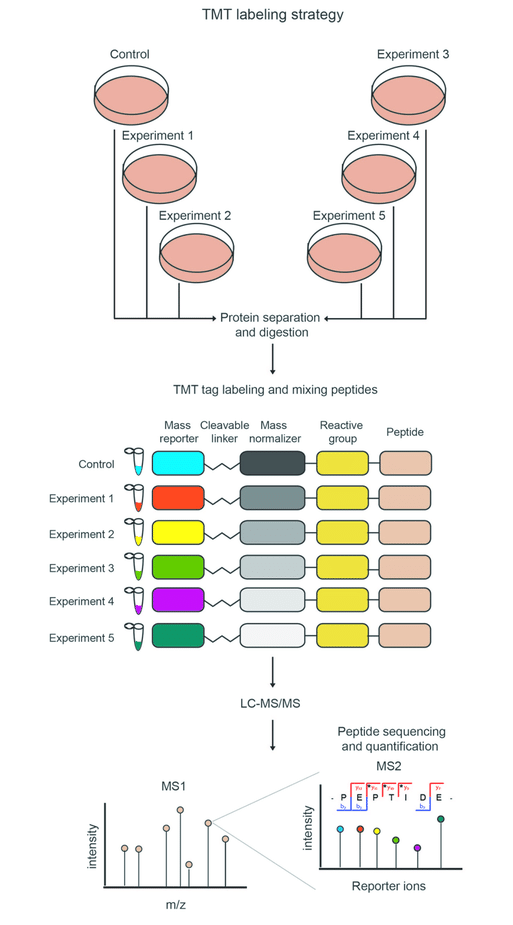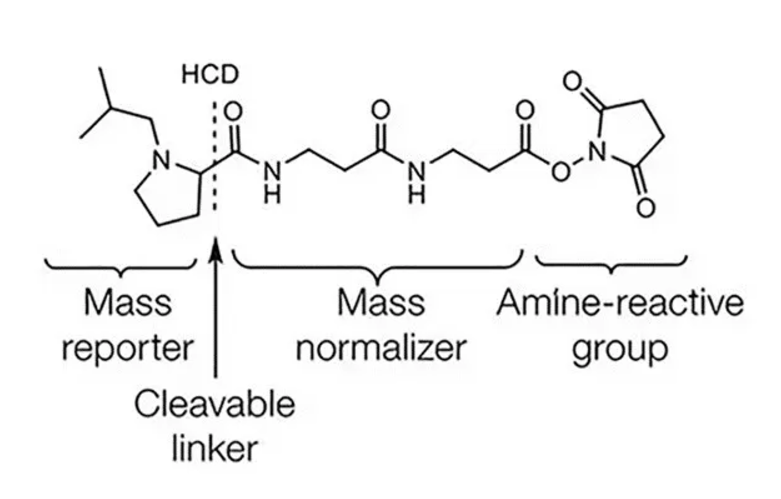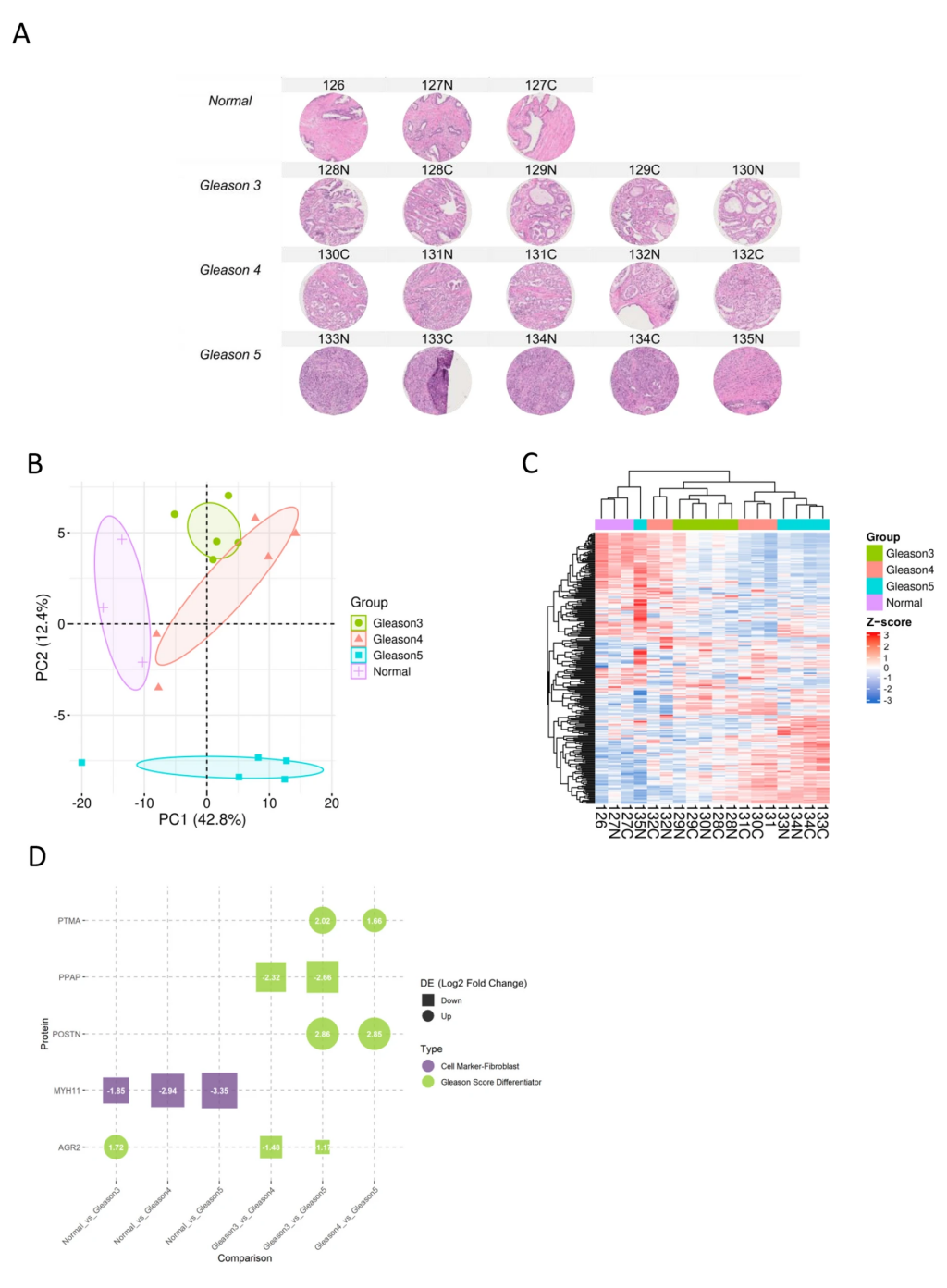Tandem Mass Tag Analysis Service
Tandem Mass Tagging (TMT) is a chemical labeling method used in mass spectrometry quantitative analysis, primarily for simultaneous analysis of multiple samples. The TMT reagent consists of amino-reactive group, mass-balancing group, and reporter ion group. The amino-reactive groups in each TMT tag have identical structures and mass, but the distribution of five stable heavy isotopes varies between the reporter ion group and mass-balancing group of different TMT tags. By labeling peptides from different sources with different tags, these peptides, despite having the same molecular weight, share the same m/z ratio in the primary mass spectrum. After high-energy collision-induced dissociation, these peptides produce reporter ions with different masses in the subsequent secondary or tertiary spectra. Quantitative analysis of these reporter ions enables accurate quantification of different samples.
The principle of tandem mass tag analysis service is to chemically label proteins in different samples to distinguish and quantify them in mass spectrometry. This is achieved through the covalent bond formation between amino-terminal and lysine residues of peptides and the reagent tags. Proteins are then qualitatively and quantitatively analyzed based on the intensity of ion peaks and their m/z ratios obtained from tandem mass spectrometry. A single TMT experiment can label up to 16 different biological samples simultaneously, offering higher throughput, better resolution, and reduced experimental error.
Services at MtoZ Biolabs
Based on the Thermo Fisher Q Exactive HF mass spectrometry platform, Orbitrap Fusion Lumos mass spectrometry platform, and Nano-LC methods, MtoZ Biolabs offers tandem mass tag analysis service with the following features:
1. High-throughput quantitative protein analysis: Capable of analyzing up to 10 samples simultaneously; suitable for large-scale clinical samples and experiments with multiple control groups to identify new biomarkers.
2. In vitro labeling: Suitable for analyzing various samples such as tissues, cells, and blood.
3. High sensitivity in mass spectrometry: Can detect low-abundance proteins and allows for broad comparison of protein relative abundance.
4. Compatible with phosphopeptide enrichment methods: Enables more accurate studies of post-translational modification changes.

Giambruno, R. et al.Frontiers in Molecular Biosciences, 2018.
Figure 1. Schematic of TMT Quantitative Proteomics Strategy.

Ege, N. et al. Cell Chemical Biology, 2021.
Figure 2. Chemical Structure Diagram of TMT Label.
The tandem mass tag analysis service first extracts and enzymatically digests proteins, then uses isotope labels to label peptides from various samples, and then combines the labeled peptides for analysis. Given the large amount of information contained in a mixture of peptides, the mixture must be separated into different fractions by chromatography. Each fraction is subjected to mass spectrometry analysis, allowing comprehensive capture of protein information. The higher the number of fractions generated, the deeper the protein coverage obtained, ultimately increasing the depth and accuracy of the study.
Service Advantages
1. Advanced Analytical Platform
MtoZ Biolabs has established advanced tandem mass tag analysis service platform, ensuring reliable, rapid, and high-precision analytical services.
2. Transparent Pricing
Our pricing is transparent, with no hidden or additional fees.
3. High Data Quality
With deep data coverage and strict data quality control, our AI-driven bioinformatics platform integrates all spatial proteomics data, providing comprehensive data reports to our clients.
4. Customized Research Solutions
MtoZ Biolabs offers customized services based on various sample types, solving your unique research questions and experimental requirements.
Applications
1. Life Sciences Research
(1) Disease Mechanism Research: TMT analysis compares protein expression differences between disease and normal samples. In cancer research, for example, protein markers in labeled samples are identified by mass spectrometry to find disease-related biomarkers and key proteins, providing a basis for disease diagnosis, treatment, and drug target discovery.
(2) Drug Development and Evaluation: By analyzing changes in the proteome before and after drug treatment, we identify drug targets and evaluate therapeutic efficacy. For instance, studying the impact of anticancer drugs on tumor cell protein expression to verify drug effectiveness and safety, supporting new drug development.
(3) Basic Scientific Research: In exploring basic biological issues such as cell signaling pathways and metabolic regulatory networks, tandem mass tag analysis service is used to mark cell or tissue proteins under different conditions, understand protein expression and modification changes and interactions, and reveal the molecular mechanisms of biological processes.
2. Biomedical Research
(1) Biomarker Discovery: By comparing proteomes of disease and healthy samples, potential biomarkers are identified. For example, screening early diagnostic biomarkers for Alzheimer’s disease to support early intervention and treatment.
(2) Recombinant Protein Drug Development: Accurately determine the molecular weight of recombinant protein drugs, enabling high-throughput analysis and multiple sample comparisons to control drug quality, ensuring consistency and potency.
3. Other Fields
(1) Food Science Research: Using TMT technology to label chemical components in food, achieving non-targeted qualitative and quantitative analysis. This can be applied to research on food quality, safety regulation, and traceability, ensuring food safety and quality.
(2) Environmental Science Research: By labeling biomolecules or organic pollutants in environmental samples, their sources, migration patterns, and biological effects are tracked, providing technical support for environmental pollution monitoring and management.
Case Study
In terms of applications, there are numerous practical cases. Xu et al. proposed an innovative method called spatial proteomics using in situ tissue protein labeling. This method combines in situ direct labeling of tissue proteins on slides with quantitative mass spectrometry for spatially resolved proteomics analysis. Through TMT labeling technology, tissue sample comparisons were made to explore its various applications in biomedical research, such as biomarker discovery and drug action mechanism research. This case demonstrates the powerful capability of the tandem mass tag analysis service in analyzing dynamic protein changes in complex biological systems.

Xu, YW. et al. Clinical Proteomics, 2024.
Figure 2. Live TMT on Paraffin-labeled Prostate Cancer TMA Slides.
MtoZ Biolabs, an integrated Chromatography and Mass Spectrometry (MS) Services Provider, provides advanced proteomics, metabolomics, and biopharmaceutical analysis services to researchers in biochemistry, biotechnology, and biopharmaceutical fields. Our ultimate aim is to provide more rapid, high-throughput, and cost-effective analysis, with exceptional data quality and minimal sample consumption. Free project evaluation, welcome to learn more details!
MtoZ Biolabs, an integrated chromatography and mass spectrometry (MS) services provider.
Related Services
How to order?







